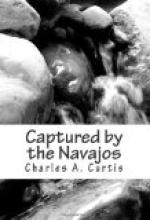“What is the matter, Miss Arnold?” I asked.
“Oh, it is something this time,” she sobbed, “that even you cannot remedy.”
“Then you think I can generally remedy things? Thank you.”
“You have always helped us, but I do not see how you can now.”
“What is the trouble, please?”
“Our poor oxen have worn their hoofs through to the quick. They were obliged to travel very fast yesterday, and over a flinty road, and their hoofs are worn and bleeding. Uncle says we must remain behind.”
“Perhaps things are not as bad as you think,” I said. “Let us go back and see.”
Rising dejectedly, and by no means inspired by hope, Brenda led the way to the Arnold wagons, where I found the father and mother on their knees beside an ox, engaged in binding rawhide “boots” to the animal’s feet. These boots were squares cut from a fresh hide procured from the last ox slaughtered by the soldier-butcher. The foot of the ox being set in the centre, the square was gathered about the ankle and fastened with a thong of buck-skin.
“Are all of your cattle in this condition, Mr. Arnold?” I asked.
“Only one other’s ’s bad’s this, but all uv ’em’s bad.”
“That certainly is a very bad-looking foot. I don’t see how you kept up, with cattle in that condition.”
“Had to, or git left.”
“That’s where you make a mistake. We could not leave you behind.”
“I didn’t think ‘twould be uv any use t’ say anythin’,” said Mr. Arnold. “You seem t’ have all you can haul now.”
“We have over three hundred head of oxen in our commissary herd that we purchased of a freighter. We can exchange with you. A beef is a beef. Turn your cattle into our herd, and catch up a new lot. When we get to Prescott you can have your old teams if you want them.”
“Thank you agin, sir. I shall want ’em. They know my ways an’ I know theirs.”
From the top of the divide the road, smooth and hard, descended to the river, ten miles away. At nine o’clock the head of the column had reached the banks, and a few moments later men and horses had partaken of the clear, cool water.
As the infantry and cavalry moved away from the shore the wagons came down the decline, the mules braying with excitement at the sight of the water gleaming through the green foliage of the cottonwoods and the verdant acres of rich grass that stretched along the river-side. Brakes were put on and wheels double-locked, until the harness could be stripped off and the half-frantic animals set free to take a turn in the river.
Sheep and oxen plunged down the banks and stood leg-deep in the current while they drank the grateful water. A few moments later all the refreshed animals were cropping the generous grass. As I was going to Captain Bayard I observed Brenda Arnold taking the odometer from its wheel and making an entry in a note-book. Approaching her, I asked: “Why are you doing that, Miss Brenda?”




